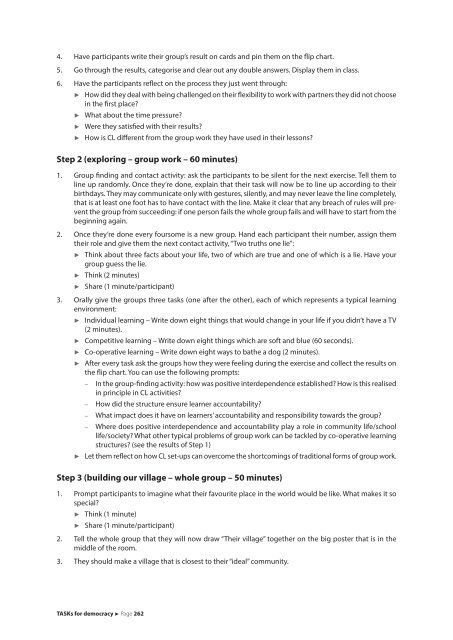TASKs for democracy
4NYw4W
4NYw4W
You also want an ePaper? Increase the reach of your titles
YUMPU automatically turns print PDFs into web optimized ePapers that Google loves.
4. Have participants write their group’s result on cards and pin them on the flip chart.<br />
5. Go through the results, categorise and clear out any double answers. Display them in class.<br />
6. Have the participants reflect on the process they just went through:<br />
<br />
<br />
<br />
<br />
How did they deal with being challenged on their flexibility to work with partners they did not choose<br />
in the first place?<br />
What about the time pressure?<br />
Were they satisfied with their results?<br />
How is CL different from the group work they have used in their lessons?<br />
Step 2 (exploring – group work – 60 minutes)<br />
1. Group finding and contact activity: ask the participants to be silent <strong>for</strong> the next exercise. Tell them to<br />
line up randomly. Once they’re done, explain that their task will now be to line up according to their<br />
birthdays. They may communicate only with gestures, silently, and may never leave the line completely,<br />
that is at least one foot has to have contact with the line. Make it clear that any breach of rules will prevent<br />
the group from succeeding: if one person fails the whole group fails and will have to start from the<br />
beginning again.<br />
2. Once they’re done every foursome is a new group. Hand each participant their number, assign them<br />
their role and give them the next contact activity, “Two truths one lie”:<br />
<br />
<br />
<br />
Think about three facts about your life, two of which are true and one of which is a lie. Have your<br />
group guess the lie.<br />
Think (2 minutes)<br />
Share (1 minute/participant)<br />
3. Orally give the groups three tasks (one after the other), each of which represents a typical learning<br />
environment:<br />
<br />
<br />
<br />
<br />
<br />
Individual learning – Write down eight things that would change in your life if you didn’t have a TV<br />
(2 minutes).<br />
Competitive learning – Write down eight things which are soft and blue (60 seconds).<br />
Co-operative learning – Write down eight ways to bathe a dog (2 minutes).<br />
After every task ask the groups how they were feeling during the exercise and collect the results on<br />
the flip chart. You can use the following prompts:<br />
– In the group-finding activity: how was positive interdependence established? How is this realised<br />
in principle in CL activities?<br />
– How did the structure ensure learner accountability?<br />
– What impact does it have on learners’ accountability and responsibility towards the group?<br />
– Where does positive interdependence and accountability play a role in community life/school<br />
life/society? What other typical problems of group work can be tackled by co-operative learning<br />
structures? (see the results of Step 1)<br />
Let them reflect on how CL set-ups can overcome the shortcomings of traditional <strong>for</strong>ms of group work.<br />
Step 3 (building our village – whole group – 50 minutes)<br />
1. Prompt participants to imagine what their favourite place in the world would be like. What makes it so<br />
special?<br />
<br />
<br />
Think (1 minute)<br />
Share (1 minute/participant)<br />
2. Tell the whole group that they will now draw “Their village” together on the big poster that is in the<br />
middle of the room.<br />
3. They should make a village that is closest to their “ideal” community.<br />
<strong>TASKs</strong> <strong>for</strong> <strong>democracy</strong> Page 262


